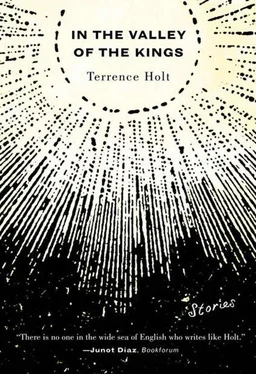His attendant, an old woman (so I thought — she may have been fifty) who silently dusted his notes without dislodging them, who pushed his wheelchair, and, I suspected, shared his bed, led me to his study. He was shriveled on the sagging vinyl slings of the chair, slumped over to his dead side, examining, under an illuminated magnifier, an ordinary page of print. He had gone almost entirely deaf as well, so I do not know by what means the old woman caused him to turn as we entered. Then she was gone and he was fussing with the switch to turn off the magnifier.
He was embarrassed as I found it for him, and to get past the moment I shouted, — I brought you something. I produced a copy of my dissertation. The smile that had tugged painfully at half his face softened, and his good eye wandered.
— Thank you, he whispered, slurring. — I can’t read it now, you know.
— You read most of it.
— Yes. But it’s done now. It’s — He groped for a word, the hand on his lap twitching. — Finished.
He sank farther into the chair, air escaping from somewhere. His hand passed vaguely over the chaos on his desk, the typewriter, dust-covered, beside him.
Embarrassed at the implied self-pity, I shouted at him, — But you didn’t read all of it.
The eyebrow on the good side rose. I wondered if that had always been a gesture of his, or if behind the nerveless face he was trying to raise them both.
— Before I bound it I added one more chapter. The committee never saw it.
I placed the book on his desk; it slid an inch or two down a slope of index cards, then lay still. — I’ll tell you what it says.
With his good hand he reached across his potbelly, retrieved his left from where it had fallen. He folded them together and closed his eyes. — Tell me. The voice seemed to come from a distance.
— It’s only a theory, really. An appendix to my thesis, with a research program to prove it out: sites, classes of artifact, periods, all that. But the theory’s the thing—
I stopped myself from adding, — And it will make me famous. I told my suspicions instead, and my voice was shaking as I spoke, quivering with the relief that at last I had called up the courage to tell. I told him of the conviction that had grown in me, over the two years of my dissertation research, through the waste hours when the labor was painful. I told him of my vision of a king, my first, naive conception of the King: a builder perhaps, who rescued his people from a period of chaos, brought the Black Land out of darkness. His people worshipped him, but then something happened. Some tragedy struck: madness, perhaps, the particular curse of kings. Madness, and his benign rule turned to tyranny, his people’s awe now underwritten by fear. Perhaps he had closed the temples, as the heretic Amenhotep IV would a millennium later.
He nodded slowly once, without looking up, just before a spasm passed silently over half his face. I stopped, wondering what it meant, unable to guess what emotion might be stirring in a man about to die, alone and in obscurity, listening to a young man outline a program for professional immortality.
— Obviously, I went on, my voice already assuming the tone of the incipient lecturer, — there must be more to the story. Apostasy, even in a king, is not enough to drive his survivors to efface all record of his rule: our picture of the Nineteenth Dynasty, after all, is clear enough. He did something, this king, that so outraged or frightened them that they felt even his name to be a menace, not to be suffered to survive. And finally all memory of him, everything he had done or touched, seen or heard — everything was destroyed. Not an echo of his reign comes down to our time. Only this complete break in the record. But what was it? What dangerous madness could so seduce a king?
I stopped, my mouth a desert. His face was carefully neutral. I took a breath, and then I launched out upon the silence.
— What if this king had set out to learn the Word of Power, the word Thoth whispered in the ear of Ptah when between the two of them they made the world? I am convinced it happened, inevitably in a land so obsessed with the supernatural: one rose up among them who personified their dream. And though of course—
My voice cracked. I knew what I must say here, but even then something in me rebelled.
— Of course there could be no such word, no power to create a world, not really. So there must have been something else, some physical sign for such a word, a substitute. By that material logic they always used to deal with the abstract, he must have built that world himself, a tomb-burial to beggar all the tombs since Menes founded the First Dynasty. That must have been it, you see: it would follow from all the Egyptian practices we know, only raised to such an extreme — an inevitable extreme, you see — that he had to ransack the kingdom to supply it. We can imagine the rationale. The Word of Power needs its own perfect seat, the proper circumstances, a temple within which its own prophet-priest the King would guard the Word, and finally at the appointed time utter it, and then the world would change, all Egypt would be transported bodily into the afterlife and death’s dominion would become the King’s.
— Imagine what power such a fantasy would give him over his people. How great an effort he could have extracted by the mere promise alone: if the nation had bent all its efforts toward the construction of a mere pyramid, not once but repeatedly in the preceding dynasty, how would they devote themselves to a sovereign who promised to bring them all within his horizon, and make the gates of death turn back upon themselves? How hard they must have worked!
— And how violently, in the end, they rebelled. The labor was too great, even for the promised end. Or perhaps they revenged themselves upon him only after he died, and they realized that he had failed? Maybe that explains the revulsion: among a people for whom belief in magic was essential to life, what if one of them set out to put that magic to some ultimate test? How savagely would they have turned to tear him when he fell?
— I have only to look, and I know I can find it, the one thing absolutely necessary. The tomb. The greatest tomb in the history of Egypt: the greatest find in the history of Egyptology. For it must be there. I am convinced it was not rifled. That’s the beauty of it, you see: if the tomb had been found, if such a quantity of goods and artifacts as it must have contained had been released, the world would be littered with evidence of his reign — and we have none! And even had there been some attempt to destroy them, the signs would still be there: records of Radedef survived the destruction of his monuments, and he was nothing to this one. I am certain of it: the King was sealed in his horizon, and they threw away the key. Perhaps they even imprisoned him in it still living. Who knows—
I stopped, finding myself teetering again on the verge of something disastrous, recognizing something in myself trying to make itself heard. I had wanted to go on, to explain where I thought this tomb might be, how best to start the search. But in the midst of that explanation I sensed a desire I had theretofore not known: a desire, almost a conviction, that in his tomb I should find the King himself, still living, and from his lips would hear — everything. The truth about everything Egyptian, about a world lost long before I was born, the truth about — even then I did not know just what I hoped to hear.
I held my tongue. Silence, like a thickening of dust. Professor — was still, his hands carefully motionless, his expression inscrutable: I felt myself teetering, a scale waiting to tip with the next weight placed upon the pan. — Imagine evidence, I cried. — Texts, artifacts, everything perfectly preserved, from a crisis early on, at the very heart of the Egyptian social, political, and religious complex. At the origins of our own—
Читать дальше










